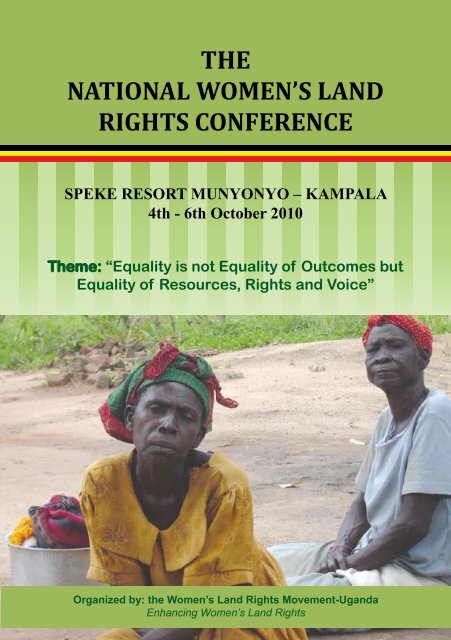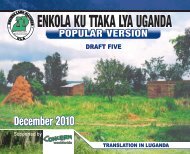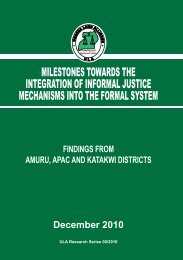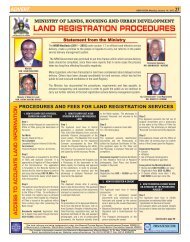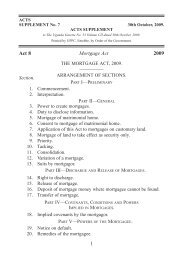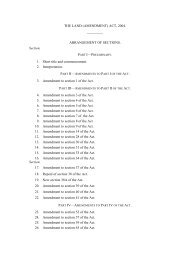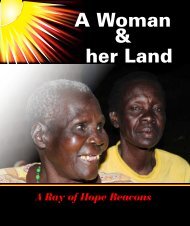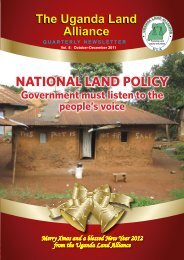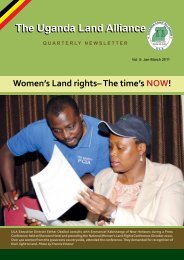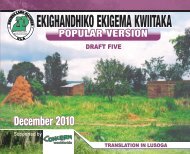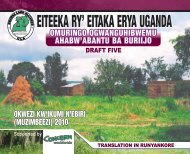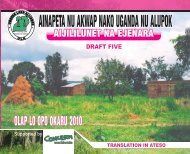the national women's land rights conference - International Land ...
the national women's land rights conference - International Land ...
the national women's land rights conference - International Land ...
You also want an ePaper? Increase the reach of your titles
YUMPU automatically turns print PDFs into web optimized ePapers that Google loves.
THE<br />
NATIONAL WOMEN’S LAND<br />
RIGHTS CONFERENCE<br />
SPEKE RESORT MUNYONYO – KAMPALA<br />
4th - 6th October 2010<br />
Theme: “Equality is not Equality of Outcomes but<br />
Equality of Resources, Rights and Voice”<br />
1<br />
Organized by: <strong>the</strong> Women’s <strong>Land</strong> Rights Movement-Uganda<br />
Enhancing Women’s <strong>Land</strong> Rights
Contents:<br />
• Executive Remarks 2<br />
• Genesis of <strong>the</strong> Women’s <strong>Land</strong> Rights Movement 6<br />
• Keynote Address 7<br />
• Case Studies 8<br />
• Presenter Biographies 13<br />
• A cry for women’s <strong>land</strong> <strong>rights</strong> 19<br />
• List of Pioneer members 20<br />
• Pioneer Member logos 21<br />
Dear participants,<br />
Editor’s Remarks<br />
I wish to take this opportunity to welcome you all to this auspicious occasion when over<br />
300 women [and men] join toge<strong>the</strong>r for <strong>the</strong> common cause of finding solutions to <strong>the</strong> biting<br />
women’s <strong>land</strong> <strong>rights</strong> concerns. Shout loud, louder and loudest; knock, and knock until<br />
something happens. Women are our mo<strong>the</strong>rs, daughters, sisters and friends- <strong>the</strong>ir <strong>rights</strong> to<br />
<strong>land</strong>, must be realized in our times, in this decade, period. Indeed <strong>the</strong> time’s now.<br />
I thank all those who contributed in one way or ano<strong>the</strong>r towards this publication. To you all,<br />
I say, Bravo!<br />
This Booklet is specially dedicated to all <strong>the</strong> women in Uganda that have lost <strong>the</strong>ir lives due<br />
to <strong>land</strong> related conflicts. May <strong>the</strong>ir souls rest in eternal peace.<br />
Wishing you all a memorable experience at <strong>the</strong> National Women’s <strong>Land</strong> Rights<br />
Conference.<br />
Tumusiime K. Deo<br />
Tel: 0712-075721<br />
Email: tumusiimedeo@hotmail.com<br />
2
Time ACTIVITY RESPONSIBILITY<br />
PRAYER BREAKFAST<br />
SESSION CHAIR<br />
Richard Ssewakiryanga<br />
7:00 – 7:20 am Arrival & Registration<br />
7:20 - 7:40 am Arrival of invited guests,<br />
7:40 -7:45 am Welcome Remarks Agnes Kirabo<br />
Prayers by Religious Leaders<br />
7:45 - 7:50 am National An<strong>the</strong>m Bahai Choir<br />
7:50 - 7:55 am -Deputy Mufti of Uganda<br />
7:55 - 8:00 am -Metropolitan Jonah Lwanga<br />
8:00 - 8:05 am -Bishop of Mukono<br />
8:05 - 8:10 am -Patricia Senoga<br />
8:10 - 8:15 am -Pastor Dr. Joseph Sserwadda<br />
8:15 - 8:30 am Background of <strong>the</strong> Women’s <strong>Land</strong> Conference Ms. Es<strong>the</strong>r Obaikol<br />
AND Presentation of <strong>the</strong> Women’s Minimum<br />
Demands<br />
8:30 - 8:50 am Keynote Address State Minister <strong>Land</strong>s, Hon. Asuman Kiyingi<br />
8.50 - 9:30 am Address by <strong>the</strong> Chief Guest H.E <strong>the</strong> President<br />
9.30-10:00am<br />
BREAK<br />
WOMEN AND LAND ADMINISTRATION<br />
SESSION CHAIR<br />
Dr. Abby Zziwa<br />
10:00 – 10:30 am Women in <strong>Land</strong> Administration, Sarah Kulata Basangwa<br />
10:30 – 11:00 am Effects of a Decentralized <strong>Land</strong> Framework on Dr. Josephine Ahikire<br />
Tenure Security for Women.<br />
11:00 - 11:30 am Impact of <strong>Land</strong> grabbing and<br />
Sarah Mujabi Mujusi<br />
Commercialization of <strong>land</strong> on women’s<br />
security of tenure.<br />
11:30 – 12:00 Impact of culture on Women’s ownership and Prof. Samson Opolot<br />
Access to <strong>land</strong><br />
12:00 - 13:00 Plenary Discussion All<br />
13:00 – 2:00 pm LUNCH All<br />
SESSION CHAIR<br />
PROGRAMME<br />
FOR THE NATIONAL WOMEN LAND RIGHTS CONFERENCE - OCTOBER 2010<br />
DAY I – MONDAY 4th OCTOBER, 2010<br />
Dr. Maria Nassali<br />
2: 00 -2:20 pm Food security, livelihood and Women’s <strong>Land</strong><br />
Rights: What if Women gave up<br />
2:20 – 2:40 pm The Role of Trade and |Trade Commitments in<br />
<strong>Land</strong> Policy in Africa, and its Implications on<br />
<strong>Land</strong> Rights especially for women, Food<br />
Security and Livelihoods”<br />
Elizabeth Kharono<br />
Jane Nalunga<br />
2:40 – 3:00 pm Plenary Discussion<br />
3:00 - 3:45 pm Case studies ULA & VEDCO<br />
3:45 - 4:00 pm Tea break<br />
4:00 - 4:30 pm Discussions :<br />
Dr. Consolate Kabonesa<br />
Gauging <strong>the</strong> African Union Framework and<br />
guidelines on <strong>land</strong> policy in Africa. Capturing<br />
WLR in <strong>the</strong> National <strong>Land</strong> Policy development<br />
process in Uganda.<br />
4:30 pm End of Day 1 All<br />
3
DAY II – TUESDAY 5 th OCTOBER, 2010<br />
Time ACTIVITY RESPONSIBLE PERSONS<br />
8:00 - 8:30 am Registration Volunteers<br />
WOMEN AND LAND JUSTICE<br />
SESSION CHAIR<br />
Mr. Bruce Kyeerere<br />
8:30 – 9:00 am Keynote Address Chief Justice/Deputy CJ<br />
9:00 – 9:20 am Enhancing access to Justice for women Rose Nakaayi<br />
9:20 –9:40 am The role of case law in upholding women’s Lady Justice Anna Magezi<br />
<strong>land</strong> <strong>rights</strong><br />
9:40 - 11:00 am The implications of <strong>the</strong> provisions of Dora Kanabahita Byamukama<br />
Marriage, Divorce & Separation Laws on<br />
Women <strong>Land</strong> Rights.<br />
11:00 - 11:30 am Tea Hotel<br />
11:30 - 12 :30 Plenary discussion<br />
12:30 - 2:00 pm LUNCH HOTEL<br />
SESSION CHAIR<br />
Rose Nakayi<br />
2:00 – 2:20 pm THE Role of <strong>the</strong> Administrator General in Miriam Namutebi<br />
securing women’s <strong>rights</strong> to <strong>land</strong> –<br />
Experiences and lessons<br />
2:20 -2:40 pm The Impact of <strong>the</strong> succession laws on <strong>the</strong> Ms. Mary Sonko<br />
realization of women’s <strong>land</strong> <strong>rights</strong><br />
2:40 - 3:10 pm Case studies, experience sharing & UCOBAC& FIDA<br />
testimonies<br />
3:10 - 3:40 pm TEA HOTEL<br />
3:40 - 8:00 pm Free Time<br />
8:00 - 10:00 pm Dinner Guest of Honour: The Nabagereka<br />
DAY III – WEDNESDAY 6 th OCTOBER, 2010<br />
Time ACTIVITY PRESENTERS RESPONSIBLE<br />
PERSONS<br />
8:00 - 9:00 am Arrival Volunteers<br />
WOMEN IN THE POLITICAL AGENDA<br />
SESSION CHAIR<br />
Hon. Sheila Kawamala<br />
9:00 - 9:15 am Official opening of <strong>the</strong> session/Keynote<br />
address<br />
9:15 - 9:40 am Women’s <strong>land</strong> Rights and Decentralization Livingstone Sewanyana<br />
9:40 - 10:00 am Gender Budgeting Ms. Margaret Kakande<br />
10:00 - 10:30 am How to raise women’s issues on <strong>the</strong><br />
Political agenda<br />
Hon. Christine Hellen<br />
Amongin Aporu<br />
10:30 - 11:00 am TEA HOTEL<br />
11:00 - 11:30 am Political parties manifestos Ms. Patricia Munabi<br />
11:30 - 12:00 pm How government intends to implement Racheal Odoi<br />
<strong>the</strong> transitional justice program for<br />
Nor<strong>the</strong>rn Uganda<br />
12:00 - 1.00 pm Plenary Discussion All<br />
1:00 - 2:00 pm Lunch HOTEL<br />
2:00 - 4:00 pm Reading of <strong>the</strong> Declaration<br />
4:00 - 6:00 Pm Tea & Departure Hotel<br />
4
Executive Remarks<br />
The Women’s <strong>Land</strong> Rights Movement-Uganda welcomes all participants in your various<br />
capacities to <strong>the</strong> National Women’s <strong>Land</strong> Rights Conference taking place from 4th to 6th<br />
October 2010 at <strong>the</strong> Speke Resort in Munyonyo Kampala.<br />
We wish to acknowledge <strong>the</strong> efforts of everyone that contributed in one way or ano<strong>the</strong>r to<br />
make <strong>the</strong> National Women’s <strong>Land</strong> Rights Conference a reality.<br />
Particular thanks to all our Donor partners who ensured that we had <strong>the</strong> financial support<br />
required to organize such a high profile event. Your usual support is <strong>the</strong> backbone to our<br />
existence.<br />
The staff at <strong>the</strong> Uganda <strong>Land</strong> Alliance, <strong>the</strong> Core organizing team, volunteers, and Members<br />
of <strong>the</strong> Working Group must be commended individually and collectively for a job excellently<br />
done. Your contribution to this <strong>conference</strong> is highly appreciated.<br />
Of course this <strong>conference</strong> would also not have happened without <strong>the</strong> women here present<br />
from all corners of <strong>the</strong> country, who have sacrificed <strong>the</strong>ir valuable time to spend four days in<br />
Kampala for this <strong>conference</strong>. Be assured that your time has not been in vain because this is<br />
<strong>the</strong> beginning of a huge campaign towards addressing <strong>the</strong> challenges faced by women over<br />
<strong>land</strong> across <strong>the</strong> country.<br />
I wish to thank H.E Yoweri Kaguta Museveni, Honourable Government Ministers, Honourable<br />
Members of Parliament, Members of <strong>the</strong> Judiciary, <strong>the</strong> Media, Members from <strong>the</strong> Academia,<br />
colleagues from Civil Society, Ladies and Gentlemen for finding it worthy to attend this<br />
National <strong>Land</strong> Rights Conference, <strong>the</strong> first of its kind in Uganda. Your continued support<br />
towards <strong>the</strong> Women’s <strong>Land</strong> Rights Movement is <strong>the</strong> key to achieve positive returns for<br />
women countrywide [and beyond].<br />
To all our dear guests from abroad, you are most welcome. Join us, work with us and let us<br />
toge<strong>the</strong>r make women’s <strong>land</strong> <strong>rights</strong> a reality.<br />
The Women’s <strong>Land</strong> Rights Movement-Uganda will be working tirelessly after <strong>the</strong> <strong>conference</strong><br />
to establish an institutional structure with offices and o<strong>the</strong>r facilities to support <strong>the</strong> cause of<br />
women particularly in regards to <strong>the</strong>ir <strong>land</strong> <strong>rights</strong>. Everyone should pick up a role to play<br />
to make <strong>the</strong> dream of <strong>the</strong> hundreds of women ga<strong>the</strong>red at this <strong>conference</strong> and <strong>the</strong> Million<br />
o<strong>the</strong>rs <strong>the</strong>y represent, come true.<br />
Finally I wish you all very fruitful deliberations.<br />
Es<strong>the</strong>r Obaikol<br />
Coordinator, Women’s <strong>Land</strong> Rights Movement-Uganda<br />
5
Genesis of <strong>the</strong> Women’s <strong>Land</strong> Rights Movement-Uganda<br />
Over <strong>the</strong> past two years, ULA has<br />
increased its activities around women’s<br />
<strong>land</strong> <strong>rights</strong> by ensuring that in <strong>the</strong> National<br />
<strong>Land</strong> Policy and <strong>the</strong> review of <strong>national</strong> laws<br />
on <strong>land</strong>, <strong>the</strong> issues of women stand out<br />
prominently.<br />
Despite <strong>the</strong> successes and <strong>the</strong> acceptance<br />
of integration of <strong>the</strong>se in policy and law,<br />
<strong>the</strong> practice has not changed. Women are<br />
still discriminated against in relation to <strong>land</strong><br />
access, ownership and control.<br />
The women’s <strong>Land</strong> Rights Movement<br />
– Uganda is holding its first event – <strong>the</strong><br />
National Women’s <strong>Land</strong> Rights Conference<br />
that will be attended by an estimated<br />
300 participants mostly drawn from <strong>the</strong><br />
grassroots, <strong>the</strong> academia, legal institutions,<br />
and Government.<br />
The Conference will also draw participants<br />
from all regions of Uganda, <strong>the</strong> East African<br />
countries, Sou<strong>the</strong>rn Sudan, South Africa,<br />
USA and Asia.<br />
The key objectives of <strong>the</strong> <strong>conference</strong> are;<br />
• To raise a common voice for<br />
women to enable <strong>the</strong>m demand<br />
for <strong>the</strong> realization and recognition<br />
of <strong>the</strong>ir <strong>rights</strong> to <strong>land</strong>.<br />
• To provide a platform for women<br />
from different regions and status<br />
to share <strong>the</strong>ir challenges and<br />
experiences on <strong>land</strong>;<br />
There is <strong>the</strong>refore a need to address <strong>the</strong><br />
issue from a practice change dimension.<br />
It is against this realization that ULA invited<br />
a group of organizations and Government<br />
departments to rethink <strong>the</strong> women’s <strong>land</strong><br />
<strong>rights</strong> question in Uganda in a bid to develop<br />
a common agenda and strategy to achieve<br />
practice change towards poverty reduction<br />
and improved household incomes and<br />
nutrition.<br />
The Women’s <strong>Land</strong> Rights Movement was<br />
thus born on <strong>the</strong> 2nd June 2010 with four<br />
Government Ministries (Ministry of <strong>Land</strong>s,<br />
Housing and Urban Development, Ministry<br />
of Gender, Labour and Social Development,<br />
Ministry of Agriculture, Animal industry and<br />
Fisheries, and Ministry of Justice), and 13<br />
Civil Society Organizations working around<br />
women’s issues in Uganda. The first and<br />
major activity of <strong>the</strong> Movement is <strong>the</strong><br />
<strong>conference</strong> scheduled for October 4th-6th<br />
2010.<br />
• Explore advocacy opportunities<br />
for practice change; and<br />
rejuvenate <strong>the</strong> women’s<br />
movement on <strong>land</strong> that has a<br />
stronghold at <strong>the</strong> grassroots,<br />
spreading its strength to <strong>the</strong><br />
<strong>national</strong> level.<br />
• The output of this <strong>conference</strong><br />
is <strong>the</strong> minimum demands for<br />
women on <strong>land</strong> in Uganda, which<br />
will guide advocacy and <strong>the</strong><br />
roadmap for <strong>the</strong> women’s<br />
movement in <strong>the</strong> following year.<br />
After <strong>the</strong> <strong>conference</strong>, <strong>the</strong> Women’s <strong>Land</strong><br />
Rights Movement will start wide campaigns<br />
aimed at ensuring <strong>the</strong> realization of <strong>the</strong><br />
key concerns deliberated upon during <strong>the</strong><br />
<strong>conference</strong>.<br />
6
• Your Excellency <strong>the</strong> president<br />
• The Honourable Ministers<br />
present<br />
• Members of Parliament<br />
• Judges of <strong>the</strong> courts of judicature<br />
• Heads of Civil Society<br />
organizations<br />
• Members from <strong>the</strong> Academia<br />
• Organizers of this <strong>conference</strong><br />
• Guest Participants from outside<br />
Uganda<br />
• Participants from Uganda<br />
• Ladies and Gentlemen, each in<br />
your respective capacities:<br />
I wish on behalf <strong>the</strong> Honourable Minister for<br />
<strong>Land</strong>s and on my own behalf, to welcome<br />
you all to this important <strong>conference</strong> on<br />
women’s <strong>land</strong> <strong>rights</strong>. I must say outright,<br />
that this is an important topic that does not<br />
only concern <strong>the</strong> women here present but<br />
all women [and men] in this country.<br />
While I appreciate <strong>the</strong> importance of this<br />
<strong>conference</strong>, I must also note with sadness<br />
that we should be ga<strong>the</strong>ring in <strong>the</strong> 21st<br />
Century to discuss about equality of <strong>rights</strong><br />
between men and women, especially over<br />
<strong>land</strong>. Some of <strong>the</strong> inequalities we are<br />
witnessing, have a historical background<br />
dating back to <strong>the</strong> colonial era, but it’s our<br />
duty to change <strong>the</strong> status of events to suit<br />
our own times. Considering <strong>the</strong> enormous<br />
role women contribute to our existence,<br />
<strong>the</strong>ir <strong>rights</strong> cannot in any way be a point for<br />
debate whatsoever.<br />
The NRM Government was <strong>the</strong> first<br />
visionary Government over <strong>the</strong> years to<br />
recognise <strong>the</strong> <strong>rights</strong> of women in Uganda,<br />
by championing <strong>the</strong> Women Emancipation<br />
campaign. Today, <strong>the</strong> proceeds of this<br />
campaign do not need fur<strong>the</strong>r elaboration<br />
7<br />
KEYNOTE SPEECH<br />
KEYNOTE ADDRESS BY THE STATE MINISTER FOR LANDS, HON. ASUMAN<br />
KIYINGI AT THE WOMEN’S LAND RIGHTS CONFERENCE, SPEKE RESORT<br />
MUNYONYO – KAMPALA, 4th-6th October 2010<br />
as you will practically witness during <strong>the</strong><br />
course of this <strong>conference</strong>. Looking though<br />
<strong>the</strong> programme for this <strong>conference</strong>, I<br />
can see very powerful women who are<br />
going to discuss various topics-some are<br />
politicians, o<strong>the</strong>rs academicians, Heads<br />
of institutions, all well learned. I have also<br />
been reliably informed that majority, if not<br />
all <strong>the</strong> women participants at this ga<strong>the</strong>ring<br />
are all not just hailing from <strong>the</strong> ‘kitchen’ like<br />
was <strong>the</strong> traditional practice, but are ei<strong>the</strong>r<br />
representing grassroots organizations<br />
or are privately engaged in various<br />
development oriented activities. This is<br />
how far we have come, and <strong>the</strong> effort must<br />
be applauded.<br />
As you may be well aware, Government<br />
toge<strong>the</strong>r with o<strong>the</strong>r stakeholders is in<br />
<strong>the</strong> final stages of drafting <strong>the</strong> National<br />
<strong>Land</strong> Policy. The Uganda <strong>Land</strong> Alliance<br />
and o<strong>the</strong>r Civil Society representatives<br />
participated actively in <strong>the</strong> critical stages of<br />
<strong>the</strong> drafting process, and I can assure you<br />
that women’s <strong>land</strong> <strong>rights</strong> concerns were<br />
prominently captured. Your participation<br />
in this process was a manifestation that<br />
Government cannot work in isolation, but<br />
needs <strong>the</strong> contribution of each one of you<br />
both collectively and individually.<br />
I know many of you must be wondering<br />
whe<strong>the</strong>r <strong>the</strong> good provisions for women’s<br />
<strong>land</strong> <strong>rights</strong> will be implemented. Before you<br />
lose hope, I urge you to appreciate where<br />
we have come from, recognise where we<br />
are, and work with Government as your<br />
main ally to reach where we want to be.<br />
The vision of <strong>the</strong> NRM of ensuring equal<br />
<strong>rights</strong> for all citizens has been welcomed<br />
by many who wish this country well.<br />
That’s why each time we have elections,
Ugandans always vote <strong>the</strong> NRM. As <strong>the</strong><br />
2011 elections draw closer, I believe all of<br />
you shall vote <strong>the</strong> NRM so that we can fulfil<br />
<strong>the</strong> pending programmes.<br />
I am informed that after here, you are<br />
launching <strong>the</strong> Women’s <strong>Land</strong> Rights<br />
Movement. Such a Movement I believe<br />
will go a long way in uniting women across<br />
<strong>the</strong> country. By virtue of <strong>the</strong> fact that<br />
already 4 Government ministries are part<br />
of <strong>the</strong> Women’s Movement; this is already<br />
confirmation that Government appreciates<br />
your effort. Count on us, and we shall<br />
offer you all <strong>the</strong> support and good will you<br />
need.<br />
With <strong>the</strong>se few words, I take <strong>the</strong> honour<br />
to wish you <strong>the</strong> very best of deliberations<br />
during this <strong>conference</strong>. Please do share<br />
your resolutions with us after <strong>the</strong> <strong>conference</strong><br />
and we shall take <strong>the</strong> necessary actions.<br />
To our dear guests from abroad, do not leave<br />
without touring Kampala. Feel at home,<br />
enjoy <strong>the</strong> best wea<strong>the</strong>r and hospitality, and<br />
please come again.<br />
I thank you.<br />
CASE STUDIES<br />
When God is sidelined-<br />
Sera recounts her painful ordeal<br />
Mbale: ‘I was cooking sweet potatoes; he<br />
poured <strong>the</strong> food down and put <strong>the</strong> sauce<br />
pans on <strong>the</strong> vehicle. He took all <strong>the</strong> things<br />
we had in <strong>the</strong> house. I was left high and<br />
dry! And yet we had been married for 41<br />
years! Later, I learnt that he had sold <strong>the</strong><br />
piece of <strong>land</strong>!’<br />
Sera, 69 lives in Mbale District. She and her<br />
husband had fifteen children, four of whom<br />
are dead. Sera is a small-holder farmer.<br />
She grows maize, beans, millet, potatoes<br />
and cassava mainly for home consumption.<br />
She has one goat, and three local chicken.<br />
She has no income and depends wholly on<br />
her working children for provision of basic<br />
domestic necessities.<br />
Sera recounts that her ex-husband, a<br />
policeman, worked in different parts of<br />
Uganda until 1983 when he retired. “After<br />
his retirement, we bought <strong>land</strong> which we<br />
lived on for over 23 years. I improved <strong>the</strong><br />
<strong>land</strong> quite a lot. I planted trees, coffee,<br />
beans, maize and bananas. During this<br />
time, my husband used to stay at home<br />
because he was too sick to work”.<br />
In 1992, Sera’s husband became a Bible<br />
teacher at <strong>the</strong> Church. “One day he<br />
came home and sold all <strong>the</strong> coffee I had<br />
harvested without my knowledge. I had<br />
gone to <strong>the</strong> well to fetch water. Worse still,<br />
I did not know what he did with <strong>the</strong> money.<br />
I told <strong>the</strong> o<strong>the</strong>r “Balokole” about it. He got<br />
annoyed and beat me up badly. Then he<br />
bought a plot of <strong>land</strong> and left me with <strong>the</strong><br />
children. Because he was sick, I followed<br />
and started living with him”. In 1993, my<br />
daughter bought <strong>land</strong> at in ano<strong>the</strong>r village<br />
and constructed a house. This is <strong>the</strong> house<br />
you see now”, she says.<br />
The turning point in Sera’s life, however,<br />
came early this year when her husband<br />
came home in a lorry shouting “pack up all<br />
<strong>the</strong> things and we go”. Sera says: “I did not<br />
know what to say because we had never<br />
discussed this. She adds, “I was cooking<br />
sweet potatoes; he poured <strong>the</strong> food down<br />
and put <strong>the</strong> sauce pans on <strong>the</strong> vehicle. He<br />
took all <strong>the</strong> things we had in <strong>the</strong> house. I<br />
was left high and dry! And yet we had been<br />
married for 41 years!<br />
“Later, I learnt that he had sold <strong>the</strong> piece of<br />
<strong>land</strong> which we had bought when he retired<br />
at only 2 million shillings. Imagine 8 acres<br />
of <strong>land</strong> for only 2 million! Worse still, <strong>the</strong><br />
8
people who bought <strong>the</strong> <strong>land</strong> cut down all<br />
<strong>the</strong> trees and <strong>the</strong> bananas, beans, maize<br />
and groundnuts which I had worked so<br />
hard to plant”.<br />
When I saw all this, I said: “God we did not<br />
steal this <strong>land</strong>, we got it through hard work.<br />
My husband vowed on our wedding day<br />
that I have given you all that I have. I have<br />
handed this problem to God. It is too much<br />
for me. It pricks my heart to remember this<br />
<strong>land</strong> which I worked for 23 years! I could<br />
nei<strong>the</strong>r eat nor sleep and I became very<br />
thin - as thin as a stalk. I could easily be<br />
blown by <strong>the</strong> wind”.<br />
“After two sleepless nights, I went to <strong>the</strong><br />
church to inform <strong>the</strong>m about my situation.<br />
They were very sorry for me. The Bishop’s<br />
wife gave me a saucepan and a basin.<br />
The next day I went to <strong>the</strong> police station.<br />
When I told <strong>the</strong>m that we had 11 children,<br />
<strong>the</strong>y advised me to settle <strong>the</strong> matter out of<br />
court so that we continue looking after <strong>the</strong><br />
children”.<br />
“Having received no proper support from<br />
<strong>the</strong> church and <strong>the</strong> police, I went to <strong>the</strong><br />
<strong>Land</strong> Tribunal and FIDA. It was <strong>the</strong> same<br />
story; I <strong>the</strong>refore decided not to consult <strong>the</strong><br />
local council because it would be a waste<br />
of time”<br />
Finally Sera says if she had <strong>the</strong> opportunity<br />
to meet <strong>the</strong> President, she would say this:<br />
when husband and wife are buying <strong>land</strong>,<br />
<strong>the</strong>y decide toge<strong>the</strong>r. The President should<br />
ensure that before a man sells <strong>land</strong>; his<br />
wife should consent to it first”.<br />
Abandoned in IDP Camp for a<br />
new catch- Atim tells her story<br />
Amuru IDP camp: Her husband picked up<br />
ano<strong>the</strong>r wife, and divorced Atim, leaving<br />
her in total disillusion in Amuru camp.<br />
Meanwhile, as a reward for his actions, <strong>the</strong><br />
man’s in-laws offered him a piece of <strong>land</strong><br />
in Giragira village, where he lives with his<br />
“new catch”!<br />
At <strong>the</strong> age of 18, Atim lived as a single<br />
girl on 1 Acre of <strong>land</strong> given to her by her<br />
parents located in Toro Camboo, Amoro<br />
Sub County.<br />
However, when <strong>the</strong> insurgency of <strong>the</strong><br />
Lord’s Resistance Army heightened, Alice,<br />
like many o<strong>the</strong>rs, was forced to flee into<br />
disarray for dear life. She ended up in<br />
Amuru camp, where she has lived since<br />
1994.<br />
While in <strong>the</strong> camp, Alice fell in love with a<br />
man, and <strong>the</strong>y married him traditionally. His<br />
name is Akera Jacob. They lived toge<strong>the</strong>r<br />
in <strong>the</strong> camp, and have six [6] children:<br />
Aber Proscovia (16), Omona Richard<br />
(13), Achiro Nancy (11), Tekwo Sande (7),<br />
Anywar Maurice (4), and <strong>the</strong> little one only<br />
named Onegiwu (1). I met 4 of <strong>the</strong>m on my<br />
visit, and <strong>the</strong> only word I could read on <strong>the</strong>ir<br />
faces was; “The future is blurred”.<br />
About a year ago, Atim’s husband who<br />
had by now started drinking himself stupid,<br />
turned into a total monster. He battered her<br />
daily, save for <strong>the</strong> fact that he was not even<br />
providing <strong>the</strong> family’s basic necessities for<br />
survival. He picked up ano<strong>the</strong>r wife, and<br />
divorced Atim, leaving her in total disillusion<br />
in Amuru camp. Meanwhile, as a reward for<br />
his actions, <strong>the</strong> man’s in-laws offered him a<br />
piece of <strong>land</strong> in Giragira village, where he<br />
lives with his “new catch”!<br />
9
Now, as o<strong>the</strong>r Internally Displaced Persons<br />
(IDPs) continue to return to <strong>the</strong>ir former<br />
homes, Atim does not know where to<br />
go. She had offered her 1Acre of <strong>land</strong> to<br />
her four bro<strong>the</strong>rs who presently live on it<br />
toge<strong>the</strong>r with <strong>the</strong>ir relatively big families.<br />
Atim offered <strong>the</strong> <strong>land</strong> in good faith and<br />
total sympathy for her siblings, and cannot<br />
attempt to reclaim <strong>the</strong> <strong>land</strong> from <strong>the</strong>m as<br />
this would provide recipe for conflict.<br />
Atim cannot even think of returning to her<br />
parents because in Acholi culture, it is<br />
abominable for a married woman to return<br />
to her parents’ home on account of divorce.<br />
Women are always required to ‘hand in<br />
<strong>the</strong>re’!!! Besides, to show that children of<br />
a divorced wife are rejects, <strong>the</strong>y are often<br />
given a nick name “Lutino luk”, which is<br />
summed up to mean disgrace.<br />
Today, <strong>the</strong> owner of <strong>the</strong> camp <strong>land</strong> has<br />
given Atim and o<strong>the</strong>rs an ultimatum to<br />
vacate <strong>the</strong> camp, as he plans to utilize his<br />
<strong>land</strong> for o<strong>the</strong>r productive activities. Atim<br />
did not want to squeeze herself on her<br />
former <strong>land</strong> toge<strong>the</strong>r with her bro<strong>the</strong>rs, but<br />
as things stand, she’s been left with no<br />
option. Even <strong>the</strong>n, she has no idea how to<br />
secure money to construct a moderate hut<br />
to house her dejected family of 7.<br />
As narrated to Tumusiime K. Deo<br />
When <strong>the</strong> blind woman was<br />
robbed of her <strong>land</strong>…<br />
Amoyokoma village: Es<strong>the</strong>r Aciro Epicu<br />
(70), a blind widow and mo<strong>the</strong>r of 6 from<br />
Amuru district now left with three (3) and<br />
nine (9) grand children, owned a 60-acres<br />
piece of <strong>land</strong> that her late husband left her<br />
with in Amoyokoma village, Pagak parish<br />
in Amuru Sub-county. However, in her own<br />
testimony, “Two years later and one day, I<br />
just learnt that three meetings were held<br />
about my <strong>land</strong> to be given to <strong>the</strong> Amuru<br />
Town Council. The people who attended<br />
<strong>the</strong> meetings were Mr. Obwoya Maoransio,<br />
Acaye Daniel, Otto Kitara and Elgino Openy<br />
and I was told that in <strong>the</strong> meeting at <strong>the</strong><br />
office of <strong>the</strong> Town Clerk, <strong>the</strong>y claimed that I<br />
did not own a piece of <strong>land</strong> in Amoyokoma<br />
and that I had a piece of <strong>land</strong> in Olik-my<br />
parent’s place.”<br />
Es<strong>the</strong>r adds that in <strong>the</strong> next meeting she<br />
was invited to attend. It was <strong>the</strong>n that she<br />
learnt of an already existing agreement<br />
with <strong>the</strong> office of <strong>the</strong> Town Clerk through<br />
<strong>the</strong> area LC II Mr. Nono. The <strong>land</strong> grabbers<br />
had conspired with Kinyera Simon and<br />
Odur Cija-her grandsons, and she was<br />
supposed to only append her signature.<br />
As she was being forced to thumbprint<br />
on <strong>the</strong> documents, she begun to cry, <strong>the</strong>n<br />
some people helped her to call <strong>the</strong> LC III<br />
Chairman to come to her rescue. To make<br />
matters worse, when <strong>the</strong> Chairman LC II<br />
Came <strong>the</strong> next morning, he only attempted<br />
to convince her to admit <strong>the</strong> terms and<br />
conditions in <strong>the</strong> agreement taking<br />
advantage of her blindness.<br />
Es<strong>the</strong>r says that later <strong>the</strong> Chairman LC III<br />
helped to take her to Court and got her a<br />
lawyer (Donge and Co. advocates) on<br />
realizing that she was left with only a plot.<br />
Donge and Co. advocates begun helping<br />
her but it wasn’t long before <strong>the</strong> lawyers<br />
were also compromised fur<strong>the</strong>r making <strong>the</strong><br />
blind woman’s life more miserable.<br />
According to Aciro Es<strong>the</strong>r Epicu, poverty<br />
and vulnerability is <strong>the</strong> worst form of<br />
violence anyone can ever face.<br />
Profile compiled by David Komakech<br />
10
How Florence escaped <strong>the</strong><br />
pangs of a “crocodile”<br />
Kampala: While it may be said that<br />
unmarried women ‘suffer due to failure<br />
to legalize <strong>the</strong>ir marriages’, experience<br />
indicates that even officially married women<br />
are denied <strong>rights</strong><br />
to <strong>land</strong> due to <strong>the</strong><br />
patriarchal family<br />
arrangement in most<br />
parts of Uganda. Like<br />
in <strong>the</strong> case of Mrs.<br />
Arorwa, an insurance<br />
broker, and resident<br />
of Namugongo an<br />
Urban area 20kms from Kampala city:<br />
Toge<strong>the</strong>r with her husband, <strong>the</strong>y struggled<br />
to secure bank loans to purchase a piece<br />
of <strong>land</strong>, and build a residential house, but<br />
registered <strong>the</strong> properties in <strong>the</strong> husband’s<br />
names as head of <strong>the</strong> household. As is <strong>the</strong><br />
trend in many families, when <strong>the</strong> marriage<br />
went sour, Mr. Arorwa got a mistress, and<br />
decided to mortgage <strong>the</strong> house without<br />
<strong>the</strong> official wife’s consent. For fear of<br />
“insubordination”, Mrs. Arorwa chose not<br />
to pursue a court case against <strong>the</strong> husband<br />
but her suffering only took an uglier turn<br />
when Mr. Arorwa sought to evict her from<br />
<strong>the</strong> house altoge<strong>the</strong>r.<br />
Mrs. Arorwa’s situation was only abated<br />
when a lawyer friend, Mrs. Kaweesi helped<br />
her lodge a caveat on <strong>the</strong> property under<br />
Section 39 of <strong>the</strong> <strong>Land</strong> Act, which permits<br />
spouses not being <strong>the</strong> owners of <strong>land</strong> to<br />
lodge caveats on <strong>the</strong> certificate of title<br />
barring any transactions on <strong>land</strong> without<br />
<strong>the</strong> consent of <strong>the</strong> spouse. Mr. Arorwa was<br />
<strong>the</strong>n taken to <strong>the</strong> police station where an<br />
agreement was reached that he would pay<br />
child support and leave Mrs. Arorwa with<br />
<strong>the</strong> house lest <strong>the</strong> law would catch up with<br />
him. He committed to this in writing and at<br />
this point, Mrs. Arorwa was saved from <strong>the</strong><br />
“jaws of a crocodile”.<br />
11<br />
Experience at <strong>the</strong> frontline<br />
of Women’s <strong>Land</strong> Rights<br />
Advocacy<br />
By Maxensia Nakibuuka Takirambule<br />
Kampala: “In my own experience I have<br />
identified that at community/grassroots<br />
levels, especially among <strong>the</strong> urban poor,<br />
formal legal systems are not accessible for<br />
most vulnerable groups”<br />
Maxensia is <strong>the</strong><br />
founder and <strong>the</strong><br />
Chief Executive<br />
Officer of Lungujja<br />
Community Health<br />
Caring Organization<br />
(LUCOHECO) a<br />
n o n - g o v e r n m e n t<br />
o r g a n i z a t i o n<br />
committed to<br />
improving <strong>the</strong> lives of<br />
community members through subsidized<br />
healthcare and o<strong>the</strong>r social services. This<br />
project provides awareness on diseases,<br />
primary healthcare support, <strong>land</strong> <strong>rights</strong><br />
guidance, treatment and advocacy on<br />
human <strong>rights</strong>, especially for those infected<br />
with or affected by HIV/AIDS.<br />
She observes that for example when<br />
women lose <strong>the</strong>ir spouses, many are<br />
ignorant of <strong>the</strong> existing legal provisions<br />
for <strong>the</strong>ir protection. Their status as first<br />
wives or <strong>the</strong> mere fact that <strong>the</strong>y have<br />
mature children does not seem to always<br />
work in <strong>the</strong>ir favor as many have lost <strong>the</strong>ir<br />
properties.<br />
O<strong>the</strong>r wives due to some cultural beliefs<br />
think <strong>the</strong>y shouldn’t own any property, <strong>land</strong><br />
or housing so <strong>the</strong>y leave it to <strong>the</strong>ir husbands<br />
to decide in whose names <strong>the</strong> property<br />
should be registered. This, coupled with<br />
fear of intimidation by <strong>the</strong> bureaucracies<br />
involved in <strong>the</strong> formal justice system, often
suffocates <strong>the</strong> widows, and <strong>the</strong>ir matters<br />
remain unresolved for many years if at all.<br />
A message to <strong>the</strong> fellow marginalized<br />
citizens of this country: Each one of<br />
you should always carry our burdens<br />
cautiously however heavy <strong>the</strong>y might be,<br />
until nightfall. We should avoid bad thinking<br />
because it leads to tension and nervous<br />
breakdown, but good thinking deals with<br />
causes and effects and it leads to logical<br />
and constructive planning-never give up.<br />
I urge that we should always pray to God<br />
to grant us <strong>the</strong> serenity to accept things<br />
we cannot change, <strong>the</strong> courage to change<br />
things we can and <strong>the</strong> wisdom to know <strong>the</strong><br />
difference.<br />
Our government, policy makers, legislators<br />
and dear <strong>national</strong>s, has each one of<br />
you ever thought about people who are<br />
suffering and o<strong>the</strong>rs being deprived of<br />
<strong>the</strong>ir <strong>rights</strong> Because <strong>the</strong>re is a wide gap<br />
between us and o<strong>the</strong>rs! Please come to<br />
our rescue by devising programmes for<br />
<strong>the</strong> minorities, revisit laws and norms that<br />
oppress <strong>the</strong> vulnerable. Remember that<br />
<strong>the</strong> underprivileged also have a right to life<br />
and well being too.<br />
To <strong>the</strong> church leaders, time is now to put <strong>the</strong><br />
Gospel into practice for <strong>the</strong> many believers<br />
suffering from different problems and need<br />
spiritual counseling in a holistic manner.<br />
Let us all be good Samaritans.<br />
Civil Society and our development partners,<br />
to you we raise our voices for continued<br />
support to enable us sustain our lives and<br />
families. We are socially and economically<br />
incapacitated with <strong>the</strong> meager resources in<br />
our developing country Uganda, shattered<br />
by poverty, corruption and wars.<br />
12
PRESENTER BIOGRAPHIES<br />
Dr. Josephine<br />
Ahikire:<br />
Presenter: Effects of<br />
a Decentralized <strong>Land</strong><br />
Framework on Tenure<br />
Security for Women<br />
Senior lecturer at <strong>the</strong> Department of<br />
A Women and Gender Studies, Makerere<br />
University and also a senior research<br />
fellow at Centre for Basic Research,<br />
Kampala. Ahikire has worked in <strong>the</strong> area of<br />
feminist political <strong>the</strong>ory and has extensively<br />
published works on Politics, labour and<br />
cultural studies. She has led various<br />
research teams on elections, politics of<br />
Access and many o<strong>the</strong>r areas connected<br />
with livelihood and social justice. Her recent<br />
publication is a book entitled: Localised or<br />
Localising Democracy: Gender and <strong>the</strong><br />
Politics of Decentralisation in Contemporary<br />
Uganda, by Fountain Publishers Kampala,<br />
Uganda (2007). Ahikire is an active member<br />
of <strong>the</strong> Uganda Women’s Movement and<br />
is also member of regional bodies such<br />
as Council for Development of Social<br />
Science Research in Africa (CODESRIA)<br />
and African Gender Institute (AGI). She is<br />
currently <strong>the</strong> Executive Director of Centre<br />
for Basic Research.<br />
Sarah Mujabi-Mujuzi<br />
Presenter: Impact of<br />
<strong>Land</strong> grabbing and<br />
Commercialization<br />
of <strong>land</strong> on women’s<br />
security of tenure.<br />
Sarah is an agriculturalist and a<br />
community development worker. She<br />
graduated with a Master of Animal Sciences<br />
of Makerere University, and later a Master of<br />
Science in Natural Resources Management<br />
of <strong>the</strong> Agricultural University of Norway.<br />
Sarah has been a Lecturer in Bukalasa<br />
Agricultural College and for <strong>the</strong> last 5 years<br />
a field team and Fundraising Manager for a<br />
prominent local NGO in Uganda, working<br />
with livelihoods improvement of small and<br />
medium holder farmers through agriculture.<br />
Sarah has made a string of publications in<br />
<strong>the</strong> field of agro-production, agro-based<br />
<strong>national</strong> and inter<strong>national</strong> trade, policy and<br />
<strong>land</strong> grabbing in relation to <strong>the</strong> plight of<br />
small holder women and men farmers of<br />
Uganda.<br />
A<br />
Professor Samson<br />
James Opolot:<br />
Presenter: Impact of<br />
culture on Women’s<br />
ownership and Access<br />
to <strong>land</strong><br />
Sociologist and Educationist by<br />
training, Professor Opolot is. He is<br />
currently a Senior Research Fellow at <strong>the</strong><br />
Centre for Basic Research (CBR), Kololo,<br />
Kampala and <strong>the</strong> Academic Registrar and<br />
Senior Lecturer at <strong>the</strong> Uganda Pentecostal<br />
University, Fort Portal Uganda. Prof. Opolot<br />
has extensive experience in basic and<br />
action research with interests in human<br />
<strong>rights</strong> based approaches to development<br />
(HRBD) focusing on equitable social<br />
and governance policy issues in relation<br />
to gender and development, poverty<br />
reduction, health and HIV/AIDS and<br />
democratisation. He was recently elected a<br />
member of <strong>the</strong> Editorial Board of Journal of<br />
Management of <strong>the</strong> Uganda Management<br />
Institute, Kampala.<br />
13
Elizabeth Kharono<br />
Presenter: Food<br />
security, livelihood and<br />
Women’s <strong>Land</strong> Rights:<br />
What if Women gave<br />
up<br />
CLEAR-Uganda is engaged in an action<br />
research process to add impetus to<br />
efforts to increase household food security<br />
through local action in Mbale district to<br />
achieve MDG 1 by 2015. She has been an<br />
active member of <strong>the</strong> women’s movement,<br />
generally, and <strong>the</strong> women’s <strong>land</strong> <strong>rights</strong><br />
research and advocacy for over ten years.<br />
Was lead consultant in <strong>the</strong> 1997 Women’s<br />
<strong>Land</strong> Rights research which highlighted<br />
women’s interests in <strong>land</strong> for incorporation<br />
in <strong>the</strong> 1998 <strong>Land</strong> Act. Amongst <strong>the</strong><br />
researches she has done is a comparative<br />
study of women’s <strong>land</strong> <strong>rights</strong> and its impact<br />
of agricultural productivity in Lira and<br />
Mbale districts, which was done under <strong>the</strong><br />
auspices of <strong>the</strong> FAO.<br />
Dr. Consolata<br />
Kabonesa<br />
Presenter: Gauging<br />
<strong>the</strong> African Union<br />
Framework and<br />
guidelines on <strong>land</strong><br />
policy in Africa.<br />
Capturing WLR in <strong>the</strong><br />
National <strong>Land</strong> Policy<br />
development process in<br />
Uganda.<br />
Dr. Consolata Kabonesa is a Senior<br />
Lecturer and Head of <strong>the</strong> Department<br />
of Women and Gender Studies, Faculty<br />
of Social Sciences, Makerere University,<br />
Kampala Uganda. Dr. Kabonesa teaches a<br />
wide range of courses that focus on human<br />
<strong>rights</strong>, peace and conflict transformation<br />
from a gender perspective; gender<br />
focused research methodology, <strong>the</strong>oretical<br />
perspectives on women and gender, and<br />
gender and social representation.<br />
She has thirteen ten years of experience<br />
as a gender analyst and researcher,<br />
gender trainer, and facilitator in areas of<br />
gender, <strong>land</strong>, health, employment and<br />
human <strong>rights</strong>. Areas of research interest<br />
include gender, human <strong>rights</strong> and conflict<br />
transformation; gender employment <strong>rights</strong><br />
for women, gender and health particularly<br />
HIV/AIDS, gender and <strong>land</strong> tenure systems<br />
in Uganda and <strong>the</strong>ir effects on women’s<br />
productivity,<br />
She attained a Ph.D. in Human and<br />
Community Development with a minor in<br />
Gender Roles in Inter<strong>national</strong> Development<br />
(multidisciplinary studies in Social<br />
Sciences), and MS in Human Development<br />
and Family Studies from <strong>the</strong> University<br />
of Illinois at Urbana-Champaign, USA;<br />
MA in English and American Literature<br />
and Higher Diploma in Education from<br />
University College Dublin, Ire<strong>land</strong>; and<br />
BA in Liberal Arts from Stonehill College,<br />
Massachusetts, USA.<br />
Rose Nakayi<br />
Presenter: Enhancing<br />
access to Justice for<br />
women<br />
Ms. Rose Nakayi is an Assistant<br />
Lecturer at <strong>the</strong> Faculty of Law<br />
Makerere University since 2002. During<br />
this period, her duties have included<br />
teaching and researching various areas of<br />
<strong>the</strong> Law, but mainly <strong>Land</strong> Law. O<strong>the</strong>r than<br />
that, her past research has been done<br />
14
while consulting for Organizations like: The<br />
Forest Peoples’ <strong>Land</strong> Rights (London), The<br />
Center for Constitutionalism (Kituo Cha<br />
Katiba), Amnesty Inter<strong>national</strong>, etc. She<br />
was Project Coordinator of <strong>the</strong> Uganda<br />
Coalition for <strong>the</strong> Inter<strong>national</strong> Criminal<br />
Court (UCICC), at Human Rights Network<br />
Uganda (HURINET- U) from February to<br />
June of 2008.<br />
At this task, she implemen ted projects<br />
to do with raising awareness on <strong>the</strong><br />
Rome Statute of <strong>the</strong> Inter<strong>national</strong> Criminal<br />
Court, and human <strong>rights</strong> in <strong>the</strong> context of<br />
armed conflict mainly in nor<strong>the</strong>rn Uganda.<br />
Prior to this, Ms. Nakayi was involved in<br />
administration at <strong>the</strong> Faculty of Law, as Cocoordinator<br />
of <strong>the</strong> LL.M program in Human<br />
Rights and Democratization in Africa run by<br />
<strong>the</strong> University of Pretoria (South Africa) in<br />
partnership with over four o<strong>the</strong>rs in Africa<br />
including Makerere. Ms. Nakayi took part<br />
in a fellowship program of <strong>the</strong> Inter<strong>national</strong><br />
Center for Transitional Justice based in<br />
New York, conducted in Cape Town South<br />
Africa in 2007. She also won <strong>the</strong> prestigious<br />
Fulbright scholarship from 2008 through<br />
2010 to pursue doctoral research.<br />
Ms. Nakayi is an advocate. She holds<br />
an LL.B from Makerere University and a<br />
Diploma in Legal Practice from <strong>the</strong> Law<br />
Development Center in Kampala obtained<br />
in 1999 and 2001 respectively. She has an<br />
LL.M degree from Clare Hall, University of<br />
Cambridge (U.K) which she acquired in <strong>the</strong><br />
year 2001. Currently, Ms. Nakayi is pursuing<br />
a doctorate at Notre Dame Law School<br />
in Indiana, USA. Her doctoral research<br />
concerns <strong>the</strong> dynamics of <strong>land</strong> <strong>rights</strong> in <strong>the</strong><br />
“customary space” in nor<strong>the</strong>rn Uganda in<br />
<strong>the</strong> milieu of <strong>the</strong> ongoing transition from<br />
armed conflict to peace.<br />
15<br />
Lady Justice Anna<br />
Magezi<br />
Presenter: The role of<br />
case law in upholding<br />
women’s <strong>land</strong> <strong>rights</strong><br />
She started work in 1970 at <strong>the</strong> Attorney<br />
General’s Chambers in Uganda where<br />
she served as a State Attorney working in<br />
Administrator General’s Office. She was<br />
transferred to <strong>the</strong> Judiciary to administer<br />
justice as a grade one Magistrate and Chief<br />
Magistrate. She subsequently became<br />
a judge in <strong>the</strong> Industrial Court of Uganda<br />
where she served for 10years while settling<br />
labour disputes. She also chaired <strong>the</strong><br />
Labour Law Committee which championed<br />
Labour Law review culminating into <strong>the</strong><br />
existing Labour Laws in Uganda. In 1980,<br />
she was appointed a High Court Judge<br />
where she worked in Civil, Family, Criminal<br />
and <strong>Land</strong> Divisions. She participated in<br />
<strong>the</strong> founding of <strong>the</strong> <strong>Land</strong> Users Committee<br />
which enhances active participation of<br />
stakeholders with <strong>land</strong> disputes.<br />
Anna Magezi graduated as a Barrister at<br />
Law and was called to <strong>the</strong> English Bar at<br />
Lincoln Inn London in 1970. In 2009, she<br />
obtained a Masters Degree from Utrecht<br />
University NL where she specialized in<br />
Inter<strong>national</strong> Law. In between she has<br />
attended short courses on Women in<br />
Development at Sussex University, in <strong>the</strong><br />
UK and also at o<strong>the</strong>r places in <strong>the</strong> USA.<br />
As a woman activist, she was a founder<br />
member of <strong>the</strong> Uganda chapter of FIDA<br />
(The Federation of Women Lawyers), <strong>the</strong><br />
Magistrates Association and Chairperson<br />
of <strong>the</strong> Judges Association of Uganda which<br />
held a successful Inter<strong>national</strong> Women<br />
Judges Conference in Uganda during her<br />
tenure as Chairperson. In June, 2010, she<br />
was privileged to attend a Reconciliation<br />
and Mediation Course at RIPA in Eng<strong>land</strong>
which opportunity enhanced her desire to<br />
promote Alternative Dispute Resolution in<br />
<strong>Land</strong> matters as well as o<strong>the</strong>r disputes in<br />
order to access justice to all and especially<br />
<strong>the</strong> vulnerable such as women.<br />
Hon. Dora Christine<br />
Kanabahita<br />
Byamukama<br />
Presenter: The<br />
implications of <strong>the</strong><br />
provisions of Marriage,<br />
Divorce & Separation<br />
Laws on Women <strong>Land</strong><br />
Rights.<br />
Professional Skills: Dora is a highly<br />
experienced Advocate; with a Masters<br />
Degree in Law from Georgetown University-<br />
USA, a Post-Graduate Diploma in Legal<br />
Practice from <strong>the</strong> Law Development Center-<br />
Kampala and a Bachelor of Laws Degree<br />
from Makerere University-Kampala.<br />
She is a 1996/7 Fellow of <strong>the</strong> Women<br />
and Public Policy Fellowship Program<br />
and participated in <strong>the</strong> Leadership and<br />
Advocacy for Women in Africa (LAWA)<br />
Fellowship Program located at Georgetown<br />
University-USA.<br />
Politics: Dora is a Member of <strong>the</strong> East<br />
African Legislative Assembly for <strong>the</strong> period<br />
2007-2012; representing <strong>the</strong> Republic<br />
of Uganda in this Regional Parliament.<br />
She currently serves on <strong>the</strong> House<br />
Business Committee which is in charge<br />
of <strong>the</strong> management and administration<br />
of EALA, and on <strong>the</strong> Accounts and Rules<br />
and Privileges Committees. She is also<br />
<strong>the</strong> Secretary General of EALA Women’s<br />
Forum.<br />
Dora is a member of <strong>the</strong> National<br />
Resistance Movement (NRM) National<br />
Disciplinary Committee, in charge of <strong>the</strong><br />
ruling party discipline.<br />
From 2001-2006 she served as a directly<br />
elected Member of Parliament of <strong>the</strong><br />
Republic of Uganda; for Mwenge County<br />
South, Kyenjojo District, Tooro Kingdom.<br />
During her tenure as Member of Parliament,<br />
she served on <strong>the</strong> Select Committee on<br />
Election Violence; and chaired Committees<br />
on - Legal and Parliamentary Affairs; Equal<br />
Opportunities and a Select Committee on<br />
Industrial Relations.<br />
Inter<strong>national</strong> Consultant And Expert:<br />
Dora has worked as a Consultant<br />
to World Bank, UNFPA, UNDP,<br />
PriceWaterHouseCoopers and UNIFEM<br />
on various topics:- <strong>the</strong>se include, “Delivery<br />
of Justice in Decentralized Arrangements”;<br />
<strong>the</strong> impact of culture on women’s <strong>rights</strong>;<br />
women’s <strong>land</strong> <strong>rights</strong>; sexual and gender<br />
based violence, women’s reproductive<br />
<strong>rights</strong>, labour <strong>rights</strong> and micro-finance.<br />
Dora also worked as an Expert for<br />
Club of Madrid on <strong>the</strong> African Women<br />
Leaders Project. The Club of Madrid is<br />
an organization comprising more than 70<br />
democratic former Heads of States and<br />
Governments from 50 countries. Its African<br />
Women Leaders Project provided support<br />
to high level women leaders in Nigeria,<br />
Sierra Leone and Uganda.<br />
She also currently works as a United Nations<br />
Expert on Female Genital Mutilation and<br />
Violence Against Women.<br />
Inter<strong>national</strong> Representative: Dora is a<br />
nominee of 2009 Class of GlobalPOWER<br />
[Partnership of Women Elected/Appointed<br />
Representatives] which entity creates<br />
sustainable, long-term partnership among<br />
a select group of elected women leaders<br />
from around <strong>the</strong> world. She is also part of<br />
<strong>the</strong> Global Women’s Rights Network.<br />
She also serves at Vice Chair on <strong>the</strong><br />
E-Parliament Council, where she represents<br />
<strong>the</strong> Africa Region. The E-Parliament is a<br />
Forum that links legislators and citizens<br />
toge<strong>the</strong>r worldwide to help solve issues on<br />
climate change, energy and democracy.<br />
Dora is President of <strong>the</strong> Inter<strong>national</strong><br />
Development Law Organization (IDLO)<br />
Alumni Association.<br />
16
Women’s Rights Activist: Dora’s women’s<br />
<strong>rights</strong> activism spans a period of over 20<br />
years. She is a prolific writer and has<br />
written several newspaper and academic<br />
articles on women’s <strong>rights</strong>. She has also<br />
made numerous presentations on gender<br />
budgeting; women’s political, economic<br />
and social <strong>rights</strong> and advocated and drafted<br />
several laws that promote women’s <strong>rights</strong>.<br />
These, include laws on - on establishment<br />
of <strong>the</strong> Equal Opportunities Commission,<br />
Sexual Harassment in <strong>the</strong> World of Work,<br />
Persons With Disability, Trafficking in<br />
Persons Bill, Female Genital Mutilation,<br />
succession, marriage, divorce and<br />
separation, <strong>land</strong> ownership, labour laws,<br />
micro-finance and reproductive health.<br />
Strategic Litigator: Dora has courageously<br />
and successfully used strategic litigation<br />
to challenge laws and practices that<br />
discriminate against women by petitioning<br />
<strong>the</strong> Constitutional Court of <strong>the</strong> Republic<br />
of Uganda. Strategic Litigation serves to<br />
ensure that laws are in conformity with<br />
human <strong>rights</strong> principles enshrined in<br />
inter<strong>national</strong> legal instruments and <strong>the</strong><br />
Uganda Constitution. It thus provides<br />
direction for Parliament in <strong>the</strong> law making<br />
process and contributes to judicial<br />
precedents. Laws and practices challenged<br />
include <strong>the</strong> Divorce Act; Succession Act; <strong>the</strong><br />
Penal Code Act on Criminal Adultery and<br />
<strong>the</strong> practice of Female Genital Mutilation.<br />
Strategic litigation has been executed<br />
under Law and Advocacy for Women in<br />
Uganda (LAW-Uganda) – for which Dora<br />
serves as a Director and co-founded with<br />
Kulsum Wakabi (RIP) in 1997.<br />
Civil Society Organizations: Dora<br />
has served in <strong>the</strong> leadership of several<br />
vibrant Civil Society Organizations such<br />
as <strong>the</strong> Uganda Association of Women<br />
Lawyers (FIDA-Uganda), Uganda Women<br />
Parliamentarians Association (UWOPA) ;<br />
Uganda Women’s Network (UWONET) and<br />
The Human Rights Network (HURINET).<br />
MARY SSONKO<br />
NABACWA (PhD.)<br />
Presenter: The Impact<br />
of <strong>the</strong> succession laws<br />
on <strong>the</strong> realization of<br />
women’s <strong>land</strong> <strong>rights</strong><br />
Mary Ssonko Nabacwa is a Senior<br />
Lecturer at Uganda Christian<br />
University, Mukono. She holds a Doctorate<br />
in Development Studies of <strong>the</strong> University<br />
of Wales, Swansea, UK. Her doctorate<br />
focused on interests and relationships<br />
among gender focused NGOs with special<br />
focus on Ugandan NGOs. She holds a<br />
Masters of Arts, Women Studies degree of<br />
Makerere University, Kampala, Uganda as<br />
well as a Bachelor of Arts, Social Sciences<br />
degree of Makerere University, Kampala,<br />
Uganda. Mary has worked as a lecturer,<br />
researcher and advisor on development<br />
issues especially in relation to gender and<br />
development. She has written a number of<br />
papers and publications.<br />
Mary has worked with key inter<strong>national</strong><br />
development organisations such as World<br />
Vision Inter<strong>national</strong> Uganda and ActionAid<br />
Uganda. She has undertaken a number of<br />
research projects on gender and women<br />
<strong>land</strong> <strong>rights</strong>, <strong>the</strong> projects including: Statutory<br />
laws and <strong>the</strong> realisation of women’s<br />
property <strong>rights</strong>, a case of <strong>the</strong> office of <strong>the</strong><br />
administrator general funded by Uganda<br />
<strong>Land</strong> Alliance; Emerging <strong>land</strong> related issues<br />
in <strong>the</strong> Acholi sub-region; nor<strong>the</strong>rn Uganda<br />
funded by Makerere Institute of Social<br />
Research; Interests and Relationships<br />
in NGO gender advocacy: A case of<br />
Uganda – doctoral <strong>the</strong>sis, University of<br />
Wales Swansea, Centre for Development<br />
Studies and Policies and practices towards<br />
women’s empowerment: Policy Advocacy<br />
by gender focused NGOs and <strong>the</strong> realities<br />
of grassroots women in Uganda funded by<br />
Action Aid Uganda.<br />
17
Mary has <strong>the</strong>oretical knowledge on a<br />
number of development issues including<br />
<strong>the</strong> following: lobbying and advocacy;<br />
civil society and development policy;<br />
development policy and planning;<br />
gender and development; <strong>the</strong> state and<br />
development; civil society networks;<br />
inter-agency (donors, government and<br />
civil society) relations; co-ordination of<br />
inter<strong>national</strong> and <strong>national</strong> NGO development<br />
programmes; community development;<br />
research methods in development among<br />
o<strong>the</strong>rs.<br />
Human Rights Law-with distinction from<br />
<strong>the</strong> University of Essex (UK) and a<br />
diploma in Legal Practice from <strong>the</strong> Law<br />
Development Centre. He is currently<br />
pursuing his PHD in <strong>the</strong> University of<br />
Cape Town in South Africa.<br />
Margaret Kakande<br />
Presenter: Gender<br />
Budgeting<br />
Livingstone<br />
Sewanyana<br />
Presenter: Women’s<br />
<strong>land</strong> Rights and<br />
Decentralisation<br />
As an inter<strong>national</strong> human <strong>rights</strong> lawyer,<br />
he has engaged in a vast array of<br />
activities in advocacy and training. He has<br />
previously served as <strong>the</strong> Deputy Secretary<br />
General of Penal Reform Inter<strong>national</strong>, as<br />
a member of <strong>the</strong> Inter<strong>national</strong> Advisory<br />
Council, HURIDOC, in Switzer<strong>land</strong> and<br />
currently serves on several boards. He has<br />
completed several consulting assignments<br />
in <strong>the</strong> areas of election monitoring,<br />
advocacy for policy change, organizational<br />
development and human <strong>rights</strong> training for<br />
several organizations including <strong>the</strong> United<br />
Nations Elections Monitoring Group in<br />
Malawi, Human Rights Network’s trainings<br />
in Sierra Leone, <strong>the</strong> Danish Centre for<br />
Human Rights training in Human Rights<br />
Procedures in Vietnam and <strong>the</strong> World<br />
Bank’s country cooperation strategy in<br />
Uganda.<br />
Mr. Sewanyana holds a Bachelor of Laws<br />
degree (Hons) from Makerere University,<br />
a Master of Laws degree in Inter<strong>national</strong><br />
Over 14 years as Poverty Analyst in<br />
Ministry of Finance, Planning and<br />
Economic Development. Among o<strong>the</strong>r<br />
duties, Margaret spearheaded <strong>the</strong> process<br />
of mainstreaming gender into <strong>the</strong> Poverty<br />
Eradication Action Plans. Since 2004<br />
she has led <strong>the</strong> process of gender and<br />
equity budgeting in government at <strong>the</strong><br />
<strong>national</strong> level. Margaret has also written<br />
and published widely; and conducted<br />
consultancy work for various <strong>national</strong> and<br />
inter<strong>national</strong> organizations.<br />
2008- Present: Head-Budget Monitoring<br />
and Accountability Unit, Ministry of<br />
Finance<br />
1996-2008: Head- Poverty Monitoring and<br />
Analysis Unit, Ministry of Finance, Planning<br />
and Economic Development<br />
1992-1995: Social policy Advisor,<br />
Programme for Alleviation of Poverty and<br />
Social costs of Adjustment (PAPSCA)<br />
1991-1992: Social Infrastructure Economist,<br />
Project Monitoring and Evaluation Unit,<br />
Ministry of Finance and Economic<br />
Planning<br />
18
1989-1991: Ag Associate Director, Institute<br />
of Statistics and Applied Economics<br />
Currently, a member of various bodies: Chair<br />
of <strong>the</strong> Advisory group to <strong>the</strong> Inter<strong>national</strong><br />
Chronic Poverty Centre, Manchester<br />
University; Chair of Council for Economic<br />
Empowerment of women (CEEWA)–<br />
Uganda Chapter; President of <strong>the</strong> Uganda<br />
Evaluation Association; Board member<br />
for <strong>the</strong> Centre for Women in Governance<br />
(CEWIGO); AT Uganda; and <strong>the</strong> Energy<br />
Development Network-Uganda.<br />
Margaret holds a Bachelor of Statistics<br />
(Makerere University); MA Development<br />
Economics (University of East Anglia,<br />
UK); Post Graduate Diploma in<br />
Feminist Economics ( ISS-The Hague-<br />
Ne<strong>the</strong>r<strong>land</strong>s).<br />
Rachel Odoi Musoke<br />
Presenter: How<br />
government intends<br />
to implement <strong>the</strong><br />
transitional justice<br />
program for Nor<strong>the</strong>rn<br />
Uganda<br />
She is responsible for <strong>the</strong> implementation<br />
of <strong>the</strong> Sector’s strategic investment<br />
plan and overseeing <strong>the</strong> reform processes<br />
in reference to <strong>the</strong>se two focus areas. She<br />
is also currently <strong>the</strong> coordinator of <strong>the</strong><br />
Sector’s Transitional Justice processes<br />
under <strong>the</strong> Transitional Justice Working<br />
Group.<br />
Ms. Odoi-Musoke is a holder of Bachelor<br />
of Laws degree from Makerere University<br />
and a Master of Laws from <strong>the</strong> University<br />
of <strong>the</strong> Witwatersrand. She has previously<br />
worked in <strong>the</strong> areas of human <strong>rights</strong><br />
focusing on socio-economic <strong>rights</strong> and on<br />
environmental law as well as practicing as<br />
an Advocate.<br />
A cry for women’s <strong>Land</strong><br />
Rights<br />
By: Es<strong>the</strong>r Obaikol<br />
For decades we have left <strong>the</strong> issue of<br />
women’s security of tenure at <strong>the</strong> mercy<br />
of our clans, bro<strong>the</strong>rs, fa<strong>the</strong>rs, uncles, inlaws.<br />
Generation after generation, we have<br />
blamed culture, tradition and customs for<br />
our plight.<br />
We live in poverty not because we cannot<br />
produce enough but because we do not<br />
control what we produce.<br />
We cannot afford better health and<br />
education for our own children not because<br />
we do not have <strong>the</strong> capacity to deliver<br />
this, but because we do not control <strong>the</strong><br />
proceeds of our labour and make decisions<br />
on our fields to enhance on household<br />
development.<br />
We have been kept at <strong>the</strong> back of <strong>the</strong><br />
debates on <strong>land</strong> not because we do not<br />
know what to say, but because <strong>the</strong>y will not<br />
let us say.<br />
We are threatened with divorce, death<br />
and violence- a threat that is so engrained<br />
in our minds and lives that we can only<br />
own <strong>land</strong> through our sons and bro<strong>the</strong>rs.<br />
Despite <strong>the</strong> many inter<strong>national</strong> treaties and<br />
<strong>the</strong> constitutional provisions on equality<br />
between men and women, security of<br />
tenure for women has remained elusive.<br />
We have lost confidence in who we are.<br />
The commonly cited statistics of 16%<br />
women own <strong>land</strong> 80% and producers have<br />
become rhetoric.<br />
A new day has come for women in Uganda<br />
not as secondary citizens but as primary<br />
citizens of this country, <strong>land</strong> forms part of<br />
one’s identity and heritage. No longer do we<br />
19
want our <strong>land</strong> <strong>rights</strong> to be kept in <strong>the</strong> private<br />
domain only accessing it through marriage<br />
or male relatives making us secondary<br />
owners and thus less than citizens but to<br />
bring us to <strong>the</strong> public domain where we<br />
share at <strong>the</strong> same table as citizens’ equal<br />
in status with men.<br />
Women’s <strong>rights</strong> to <strong>land</strong> are human <strong>rights</strong> and<br />
must be recognised as such. Substantive<br />
<strong>land</strong> reforms that boldly provide for equality<br />
not in access but in ownership and control<br />
of <strong>land</strong> by men and women stands out<br />
key for us. This equality should extend to<br />
customary tenure which forms over 80% of<br />
<strong>land</strong> in Uganda and where most of us live.<br />
Women’s <strong>land</strong> Rights are Human Rights<br />
and we need not make fur<strong>the</strong>r justification.<br />
We, <strong>the</strong> women in Uganda are not going<br />
to continue burying our heads in <strong>the</strong> sand.<br />
We are claiming rightfully what belongs<br />
to us. We must be recognised as citizens<br />
with equal <strong>rights</strong> as men, this equality not<br />
being of outcomes but equality of Rights,<br />
resources and voice. We stand up united<br />
with one voice as citizens of this country.<br />
Our <strong>land</strong>, our dignity.<br />
MEMBERS OF THE WOMEN'S LAND RIGHTS MOVEMENT WORKING GROUP<br />
Name E-mail Phone Organization District<br />
1 Agnes Kirabo agneskirabo@yahoo.com 772564951 VEDCO Kampala<br />
2 Anna Magezi (Justice) anna_magezi@yahoo.com 752700777 High Court Kampala<br />
3 Annet Kabarungi akabarungi@yahoo.com 703205353 Min. of Gender Kampala<br />
4 Debra Musuya clear.uganda@gmail.com 757994353 Clear Mbale<br />
5 Deborah Gasana dgasana.lap@uls.or.ug 774370115 ULS Kampala<br />
6 Elizabeth Kharono clear.uganda@gmail.com 712651673 CLEAR Mbale<br />
7 Emmanuel Kabishanga kabishanga@gmail.com 712717105 New Horizons Kampala<br />
8 Es<strong>the</strong>r Obaikol eobaikol@ulaug.org 414540048 ULA Kampala<br />
9 Elizabeth Nahamya (Justice) 777336024 War Crimes Kampala<br />
10 Federice Nshemereirwe fnshemereirwe@yahoo.com 772387928 Min. Agriculture Kampala<br />
11 Frances Birungi birungifrances@yahoo.com 772926214 UCOBAC Kampala<br />
12 Ignatius Oloyi ignatius_oloyi@yahoo.ca 703042950 LEMU Kampala<br />
13 Judy Adoko judyadoko@yahoo.com 703042950 LEMU Kampala<br />
14 Justice Anna Magezi anna_magezi@yahoo.com 752700777 High Court Kampala<br />
15 Justine Kyarikunda kyaristine@yahoo.com 782705488 NAWOU Kampala<br />
16 J.S Mpagi sanyumpagi@yahoo.co.uk 772516980 Min. of Gender Kampala<br />
17 Maria Gorette Karuhanga mmgorette@yahoo.com 772883232 FIDA Kampala<br />
18 Miriam Ismail bahai.oea@gmail.com 713839925 BAHAI Kampala<br />
19 Monica Birungi monibiru@yahoo.com 712121094 ULS Kampala<br />
20 Santino Dramani dramanisantos@yahoo.com 752658296 Min. <strong>Land</strong>s Kampala<br />
21 Sophie Kyagulanyi sophie.kyagulanyi@actionaid.org 414510016 Action Aid Kampala<br />
22 Laureen Karayi laureen@uwonet.or.ug 775555478 UWONET Kampala<br />
23 Tumusiime K. Deo tdeo@ulaug.org 712075721 ULA Kampala<br />
20
Contacts & logos of pioneer member<br />
organizations<br />
Ministry of Gender Labour<br />
and Social Development<br />
Ministry of Justice and<br />
Constitutional Affairs<br />
Ministry of <strong>Land</strong>s, Housing<br />
and Urban Development<br />
Ministry of Agriculture, Animal<br />
Industry & Fisheries<br />
Uganda <strong>Land</strong> alliance<br />
41-4-540048<br />
ula@ulaug.org<br />
LEMU<br />
77-2-856212<br />
lemu@utlonline.co.ug<br />
Legal Aid Project<br />
41-4-342412<br />
uls@uls.or.ug<br />
Action Aid Uganda<br />
41-4-510016<br />
aaiu.info@actionaid.org<br />
NAWOU<br />
41-4-258463<br />
nawou@uol.co.ug<br />
UWONET<br />
41-4-286539<br />
info@uwonet.or.ug<br />
FIDA<br />
41-4-530848<br />
fida@fidauganda.or.ug<br />
VEDCO<br />
41-4-270598<br />
vedco@vedco.or.ug<br />
New Horizons<br />
71-2-717105<br />
kabishanga@gmail.com<br />
Bahai Faith<br />
772401109<br />
oeabahai@spacenet.co.ug<br />
CLEAR<br />
75-7-994353<br />
clear.uganda@gmail.com<br />
21
23<br />
Coordinating Office<br />
Block 29, Plot 1521 Mawanda Road, Kamwokya,<br />
P. O. Box 26990 Kampala,<br />
Tel: +256-414-540048<br />
Fax: +256-414-540038<br />
Email: wlrm-uganda@ulaug.org


